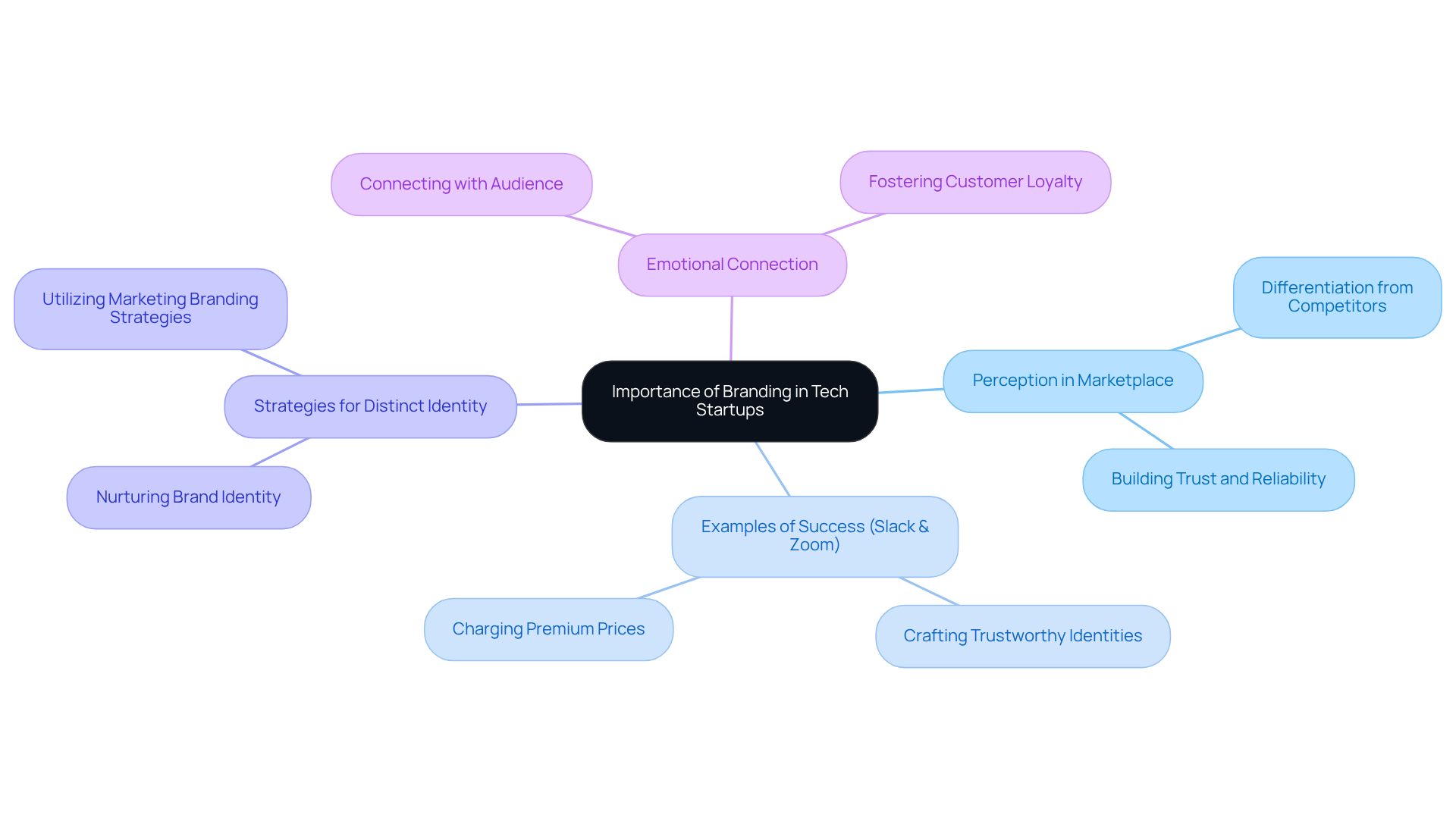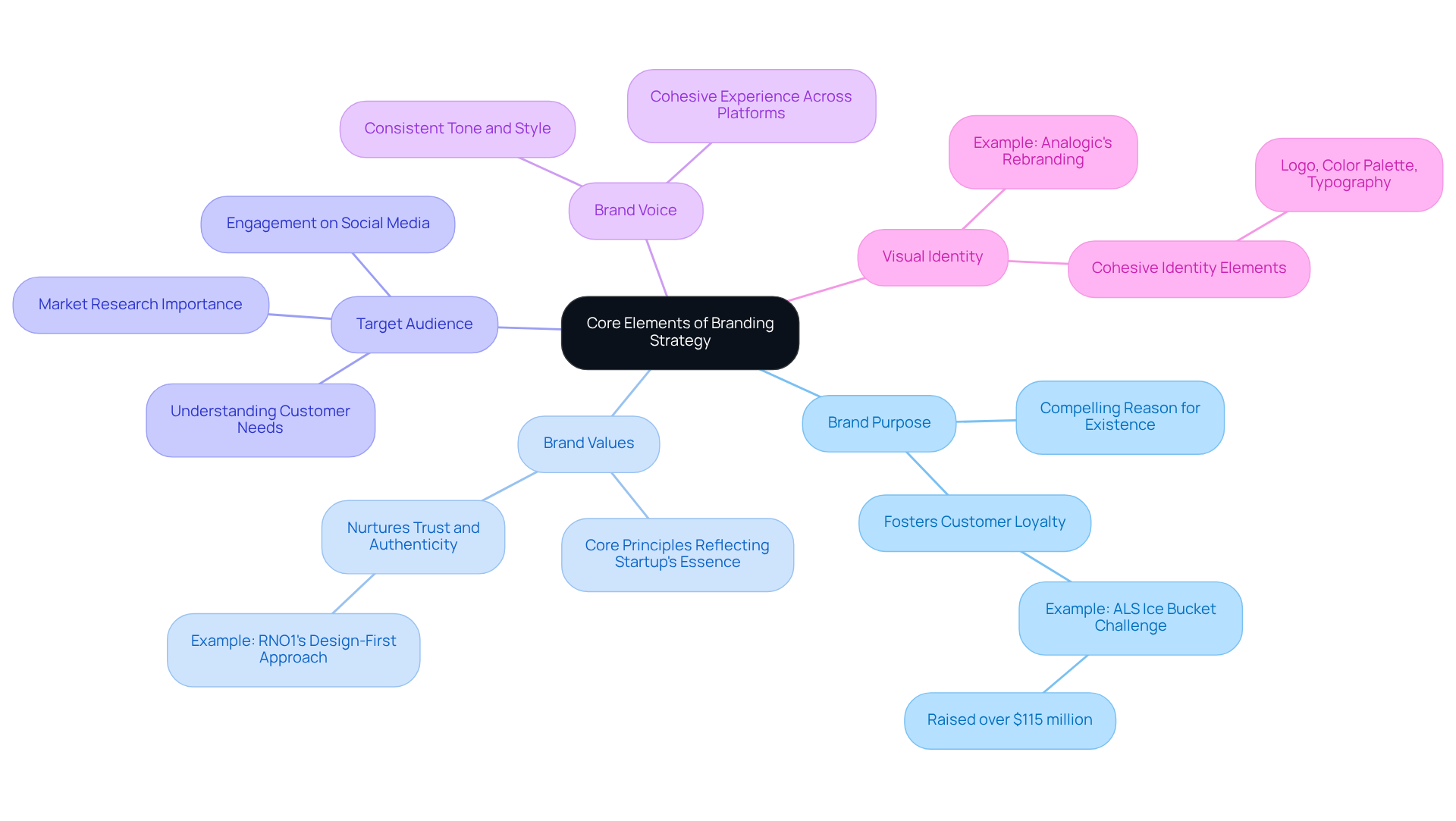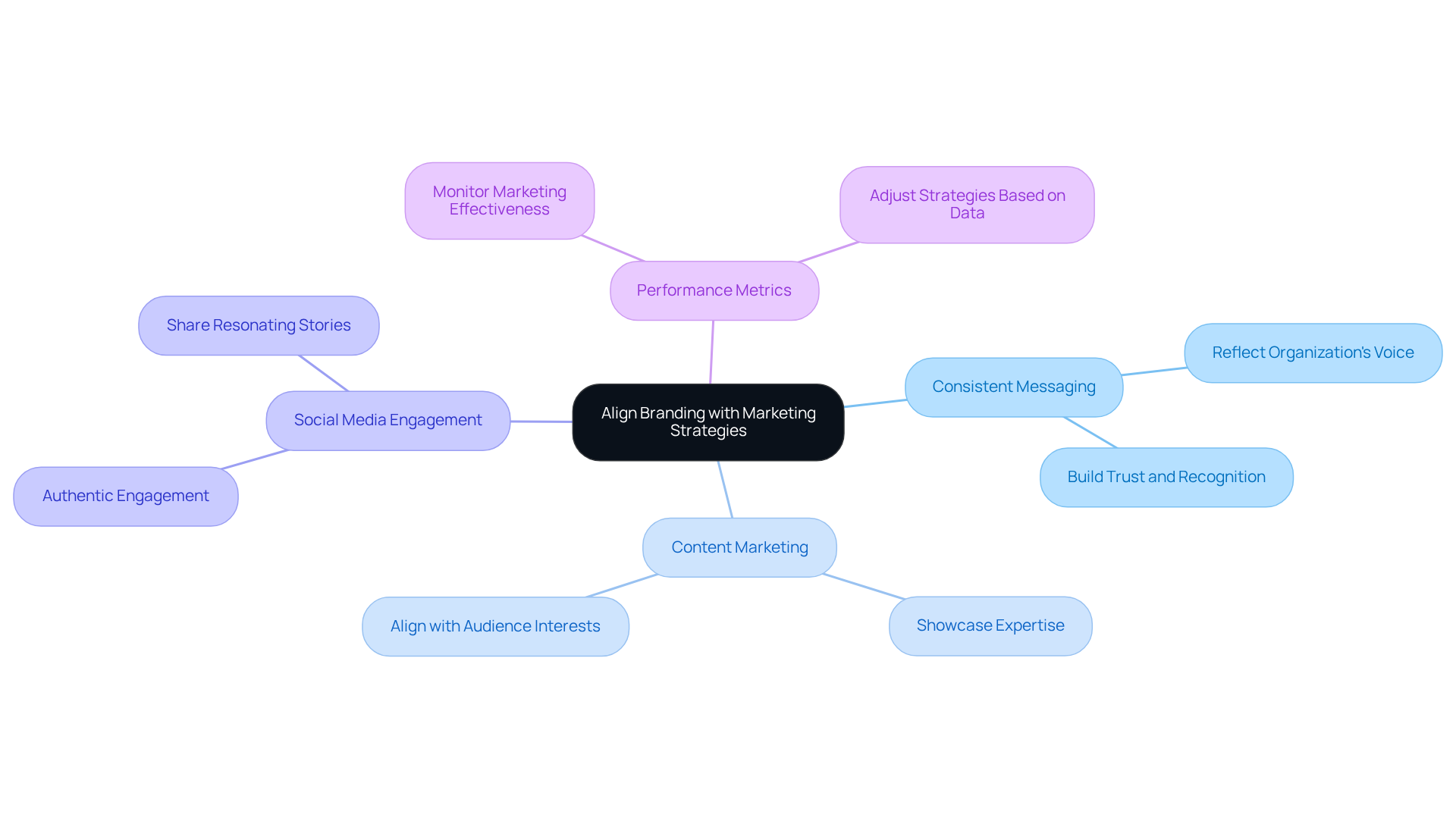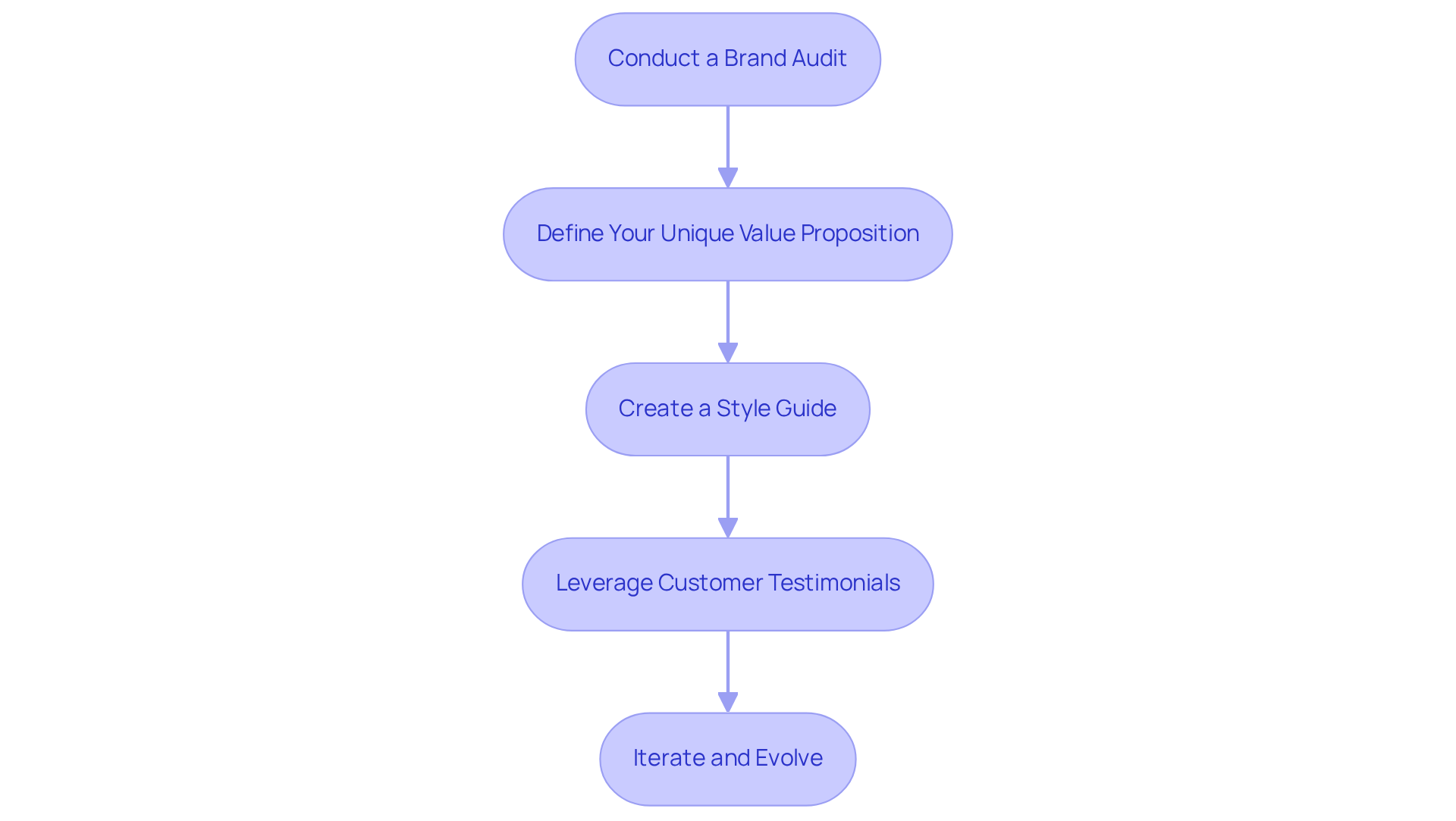Overview
Tech startups often grapple with the challenge of establishing a strong brand presence in a crowded market. This struggle can lead to feelings of uncertainty and frustration, as founders may worry about how to differentiate themselves and connect with their audience. However, there is hope. By implementing five key marketing branding strategies, startups can find their footing and thrive. These strategies include:
- Defining their brand purpose and values
- Understanding their target audience
- Developing a consistent brand voice
- Establishing a strong visual identity
- Nurturing a distinct brand identity and aligning it with marketing efforts
Nurturing a distinct brand identity and aligning it with marketing efforts not only fosters customer loyalty but also paves the way for meaningful growth in a competitive landscape. Remember, you are not alone in this journey; many have walked this path and found success by embracing their unique story and values.
Introduction
Branding is the lifeblood of tech startups, shaping how they are perceived in an increasingly crowded market. As competition intensifies heading into 2025, it becomes crucial for founders to cultivate a strong brand identity. Many may feel overwhelmed by the complexities of branding, wondering how to ensure their startup stands out and resonates with its target audience.
This article explores essential marketing branding strategies that not only differentiate startups but also foster loyalty and drive growth. Together, we can navigate these challenges and discover how to create a brand that truly reflects your vision and connects with your audience.
Understand the Importance of Branding in Tech Startups
Branding is more than just logos or catchy taglines; it embodies how a technology company is perceived in the marketplace. Many new businesses struggle with this, feeling like just another tech tool lost in a sea of competition. This can be disheartening, especially as we approach 2025, where the race for attention is fiercer than ever.
It’s essential to recognize that a powerful identity can elevate a business from obscurity to a trusted name that resonates with its audience. Companies like Slack and Zoom have shown us the way, crafting identities that inspire trust and reliability. This approach has allowed them to charge premium prices and build a .
By nurturing a distinct brand identity, technology companies can utilize marketing branding strategies to not only set themselves apart but also foster lasting customer loyalty and drive meaningful growth.
Remember, your brand is your story—let it connect with your audience on an emotional level.

Develop Core Elements of a Branding Strategy
Creating a comprehensive marketing branding strategy for tech startups can be an overwhelming task, but it’s essential for your journey. Let’s explore some key elements that can help you build a strong foundation for your brand, ensuring you feel supported every step of the way.
- Brand Purpose: At the heart of your startup lies a compelling reason for its existence, transcending mere profit generation. This purpose should resonate deeply with your target audience, serving as a guiding light for all your branding efforts. When you articulate a powerful organizational purpose, you can foster customer loyalty and engagement. Just think about the ALS Ice Bucket Challenge, which raised over $115 million—an inspiring example of how a strong mission can galvanize support and drive engagement.
- Brand Values: Establishing core principles that reflect your startup’s essence is vital. These values should shine through in your messaging and interactions, nurturing trust and authenticity with your audience. As Jared Schwitzke noted, RNO1's design-first approach leads to meaningful outcomes, underscoring the importance of aligning your values with customer expectations.
- Target Audience: It’s crucial to develop a profound understanding of your customers—their needs, aspirations, and how your company can fulfill those needs. Conducting thorough market research is a necessary step in gathering insights that will inform your marketing branding strategies. Engaging with your audience on social media not only helps you build relationships but also fosters loyalty and connection.
- Brand Voice: Your communications should embody a that aligns with your brand's personality. This voice must resonate across all platforms, ensuring a cohesive experience for your audience. By maintaining consistency in your company voice, you strengthen your startup’s identity and values, making it more relatable and trustworthy.
- Visual Identity: Your visual language—including your logo, color palette, and typography—should create a cohesive identity that aligns with your company’s message. A well-defined visual identity enhances recognition and can effectively communicate your brand’s mission and values. Take Analogic’s rebranding effort as an example; it illustrates how visual identity can powerfully convey a brand’s essence.
By weaving these elements into your marketing branding strategies, you can establish a robust foundation for your marketing initiatives, ultimately fostering growth and success in a competitive landscape. Remember, you’re not alone in this journey; we’re here to support you as you navigate the exciting world of tech startups.

Align Branding with Marketing Strategies for Maximum Impact
To achieve maximum impact, tech startups often face the challenge of into their marketing branding strategies. This can be a daunting task, as inconsistent branding can lead to confusion and a lack of trust among potential customers. However, by nurturing a cohesive brand identity, startups can build stronger connections with their audience. Here are some best practices to consider:
- Consistent Messaging: It’s essential that all marketing materials reflect your organization’s voice and values. This consistency not only builds trust but also fosters recognition, creating a sense of familiarity that your audience can rely on.
- Content Marketing: Developing valuable content that showcases your organization’s expertise while aligning with your audience's interests can be incredibly beneficial. This approach not only boosts your visibility but also positions your startup as a thought leader in your field, inviting your audience to engage with your insights.
- Social Media Engagement: Authentic engagement on social media platforms allows you to connect with your audience on a personal level. Share stories that resonate with your brand's values and mission, inviting your audience to share their experiences and fostering a sense of community.
- Performance Metrics: Monitoring the effectiveness of your marketing efforts through analytics is crucial. By adjusting your strategies based on data insights, you can enhance engagement and conversion rates, ensuring that your efforts are aligned with your audience's needs.
By aligning brand identity with marketing branding strategies, startups can create a unified approach that resonates with their audience and drives growth. Remember, you are not alone in this journey; many founders share similar experiences, and together, we can navigate the path to success.

Implement Effective Branding Practices: Steps and Examples
Implementing effective marketing branding strategies can feel overwhelming, especially for tech startup founders navigating a competitive landscape. It’s essential to take actionable steps that not only address current challenges but also foster growth and connection with your audience.
- Conduct a Brand Audit: Start by assessing your current brand positioning. Gathering feedback from customers and stakeholders can illuminate your strengths and areas for improvement. A thorough audit often reveals insights that inspire strategic changes, allowing you to connect more deeply with your audience.
- Define Your Unique Value Proposition (UVP): It’s vital to articulate what sets your business apart from competitors. A compelling UVP is not just a statement; it’s the heart of your brand. Research shows that startups with a well-defined UVP are 30% more likely to achieve sustainable growth. Let this proposition guide your branding efforts, ensuring it resonates with your audience.
- Create a Style Guide: Developing a comprehensive guide that outlines your company’s visual and verbal identity is crucial. This consistency across all platforms fosters and builds trust with your audience, reinforcing the connection you aim to create.
- Leverage Customer Testimonials: Showcasing positive feedback from users can significantly enhance your credibility. For instance, consider how a tech startup could feature case studies that highlight their product’s real-world impact. Testimonials from clients like Jared Schwitzke and Leigh Ann Tucker not only illustrate the effectiveness of your strategies but also resonate with potential customers, building a sense of community around your brand.
- Iterate and Evolve: Understand that brand identity is a journey, not a destination. Continuously revisiting and refining your marketing strategy based on market trends and customer feedback is essential. This adaptability ensures you remain relevant in a fast-paced industry, nurturing the relationship with your audience.
By embracing these steps, tech startups can implement marketing branding strategies that genuinely resonate with their audience, fostering connection and driving long-term success. Remember, you’re not alone in this journey; the path to effective branding is one of growth, learning, and community.

Conclusion
Branding stands as a vital pillar for tech startups striving to carve out their unique identity in a fiercely competitive landscape. The essence of a startup's identity transcends mere aesthetics; it embodies the values, purpose, and emotional connections that resonate deeply with the target audience. Establishing a strong brand not only sets a company apart from its competitors but also nurtures trust and loyalty among customers, paving the way for sustained growth and success.
Many startups grapple with defining their brand. The challenge lies not just in creating a logo or catchy tagline but in articulating a clear brand purpose, establishing core values, and truly understanding the target audience. Maintaining a consistent brand voice and crafting a cohesive visual identity are essential components of an effective branding strategy. Each of these elements contributes to the overall perception of the brand, allowing startups to foster meaningful relationships with their audience. Furthermore, aligning branding with marketing strategies ensures that messaging remains consistent and impactful, ultimately enhancing customer engagement and driving conversions.
The journey of branding is ongoing, requiring continuous reflection and adaptation. We encourage tech startups to embrace this journey wholeheartedly. Conducting regular brand audits, defining unique value propositions, and leveraging customer testimonials can be transformative. By implementing these effective branding practices, startups can navigate the complexities of the tech industry and flourish in a landscape where brand identity is pivotal to achieving long-term success. Investing in branding is not merely a strategy; it is a commitment to crafting an authentic narrative that resonates deeply with customers, laying the foundation for a prosperous future. Together, let’s foster a community where your brand can thrive.
Frequently Asked Questions
What is the significance of branding for tech startups?
Branding is crucial for tech startups as it shapes how a company is perceived in the marketplace, helping them stand out in a competitive environment.
How can branding impact a technology company's success?
A strong brand identity can elevate a business from obscurity to a trusted name, enabling companies to charge premium prices and build a loyal user base.
Can you provide examples of successful branding in tech?
Companies like Slack and Zoom have successfully crafted brand identities that inspire trust and reliability, contributing to their growth and customer loyalty.
What role does emotional connection play in branding?
An effective brand connects with its audience on an emotional level, which is essential for fostering lasting customer loyalty and driving growth.
What should tech startups focus on when developing their brand?
Tech startups should focus on nurturing a distinct brand identity and utilizing marketing strategies that set them apart from competitors.




